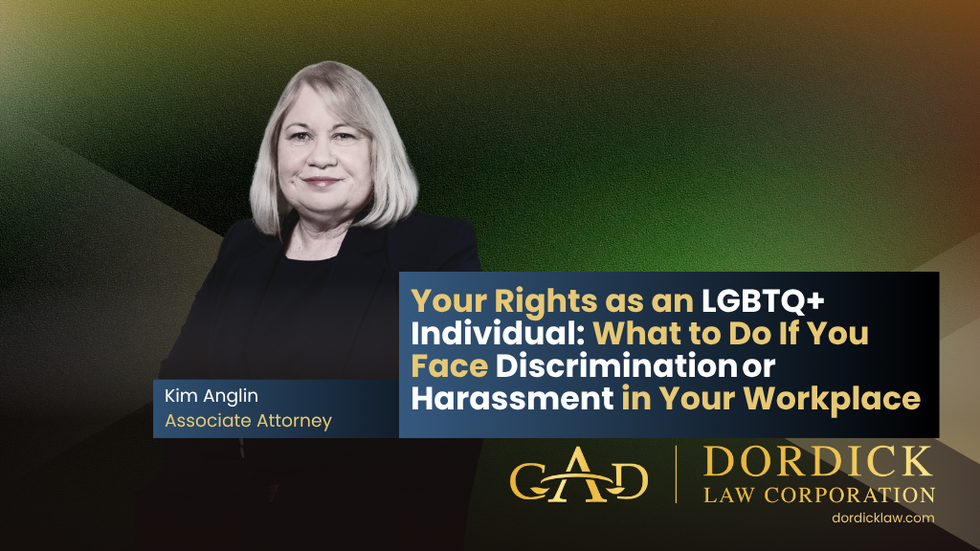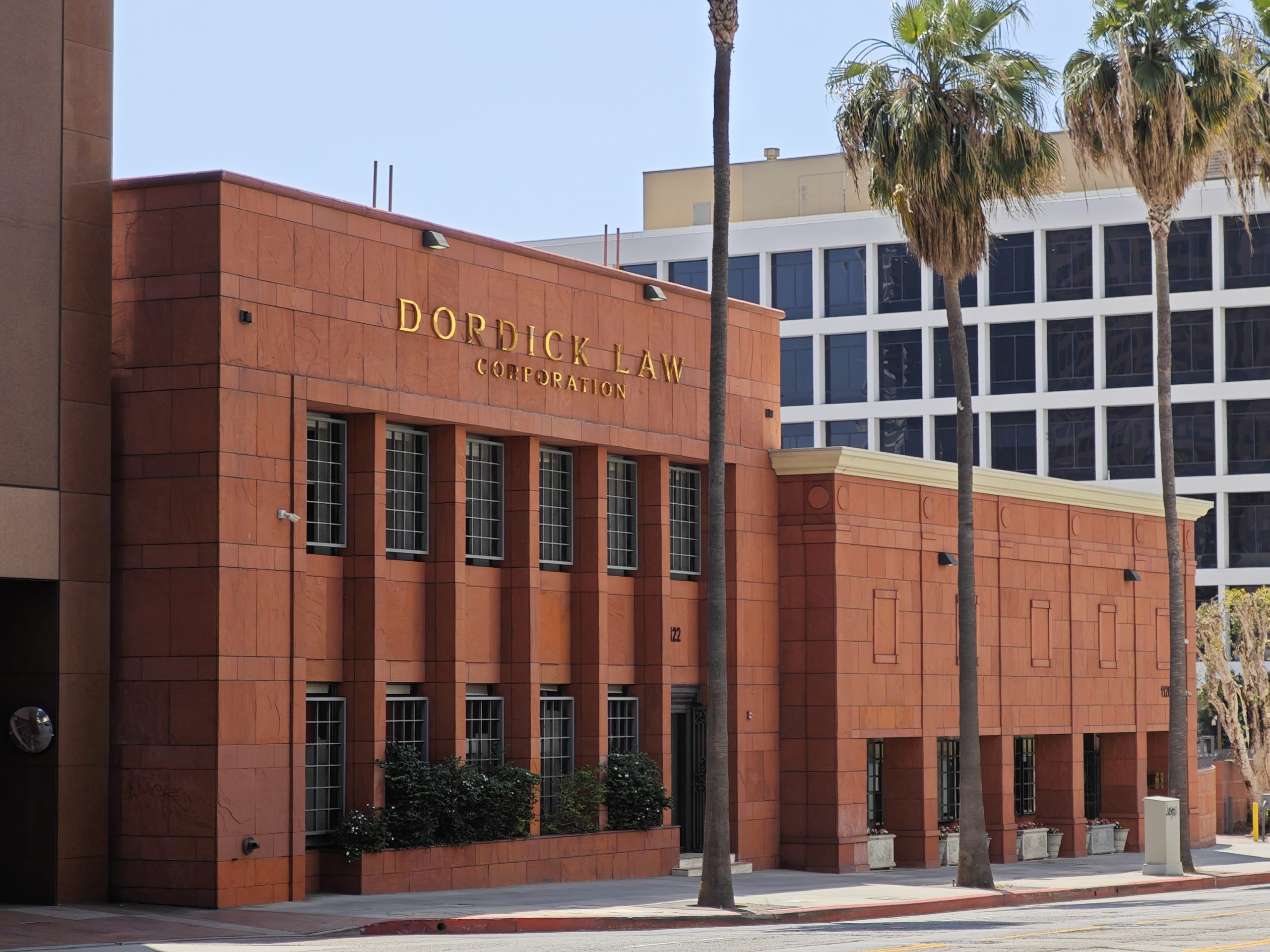
In California, employees are protected from discrimination based on their gender identity, gender expression, or sexual orientation. The Fair Employment and Housing Act, known as the “FEHA,” and Title VII of the federal Civil Rights Act, known as “Title VII,” protect workers who experience discrimination, harassment – either quid pro quo harassment or hostile work environment harassment – and retaliation for reporting such discrimination and harassment.
Specific Protections for LGBTQ+ Employees
Members of the LGBTQ+ community should be aware that the FEHA specifically protects individual workers based on their sexual orientation, gender expression, or gender identity. It is a violation of the FEHA and Title VII for an employer of five or more employees to fire, demote, fail to hire, fail to promote, harass, or otherwise discriminate against LGBTQ+ employees based on an employee’s actual or perceived sexual orientation, gender expression, or gender identity.
Even further, California law recognizes gender non-conforming and non-binary identities. Employers are also prohibited from discriminating against employees in working conditions, pay, participation in training or apprenticeship programs, employee organizations, or unions.
Application to Job Applicants
Legal protections under California and federal law apply to applicants for jobs and employees. An employer may not ask an applicant about their sexual orientation, gender identity, or gender expression directly or indirectly during an interview or the application process. For instance, asking about your spouse or your preferences to determine your sexual orientation or gender identity. Also, you cannot be required to disclose your gender, and gender identity may not be used as a condition of employment.
Protection for Transgender and Transitioning Employees
Employees often worry about whether they are protected if they come out at work or if they transition while employed. California and federal law protect employees with transgender and transitioning status under these same statutes.
Protection Against Discrimination Based on Perception
Interestingly, California law also makes it illegal for employers to discriminate based on “perceived” sexual orientation, gender expression, or gender identity. An employer may make certain assumptions as to an employee’s sexual orientation, gender expression, or gender identity. Whether their assumptions are correct or not, it is illegal to discriminate or harass an individual employee or applicant based on their perceived sexual orientation, gender expression, and/or gender identity. So, if an employer is mistaken, it is still a violation of the law. It is also illegal for an employer to discriminate or harass an employee because they associate with LGBTQ+ individuals.
California Family Rights Act (CFRA)
Other protections for LGBTQ+ employees are codified in the California Family Rights Act (“CFRA”), which provides eligible employees (where the employer employs more than five employees) with job-protected leave to care for a child, spouse, domestic partner, parent, grandparent, grandchild, or sibling with a serious health condition and for the employee’s serious health condition.
Employers may not deny or interfere with an eligible employee’s rights to job-protected leave based on a protected status such as one’s sexual orientation, gender expression, or gender identity. Other protected statuses include age, race, religion, national origin, ancestry, veteran status, physical or mental disability, medical condition, and other characteristics. These rights apply to LGBTQ+ individuals in the same fashion as they do to all eligible employees.
Multiple Grounds for Discrimination
It is important to note that, unfortunately, an employer may sometimes discriminate or harass an employee based on one or more protected characteristics. For example, terminating an employee based on their age (over 40), gender identity as trans, or physical disability of diabetes. Either separately or in combination with other discriminatory or harassing actions, it is still illegal.
What Should You Do If You Feel You Are Being Discriminated Against Based on Your Sexual Orientation, Gender Expression, or Gender Identity?
- You should immediately begin to document what is happening to you. Keep a journal at home (not at work) and write down a description of what happened to you. Make sure you include the date, the location, who was involved, what was said or done, and add all of the details to your journal entry. Also, save any emails or notes, texts, or other documentation. Make a note of full names and contact information for witnesses to any discriminatory events.
- Do not use a recording device to record conversations or meetings. (It is illegal to record another person without their knowledge and permission in California.) Keep your journal at home so that it cannot be lost at work or, worse, left behind if you are terminated.
- Make a record of each discriminatory or harassing event as close in time as possible to when the events happened, as even a week later, memories start to fade. Be consistent in recording events so that you can establish a pattern and a thorough record.
- Review your employee handbook or policies issued by your employer and check the information on how to report harassment and discrimination. Some companies may require you to report any claims to HR, a hotline, or a third-party vendor. Report the harassment and discrimination to your supervisor, HR, the personnel office, or a manager, depending on your company’s management structure.
- If you are a member of a union, you may find reporting guidelines in your union’s collective bargaining agreement. You must report the behavior so the company has notice and an opportunity to investigate and correct the problem.
- If the company fails to take action and the discrimination and/or harassment continues, you should contact a lawyer who specializes in employment law to seek guidance.
If you or someone you know has experienced workplace discrimination based on sexual orientation, gender identity, or gender expression, you may be entitled to compensation for emotional distress, wrongful termination, or other unlawful treatment. At Dordick Law Corporation, we have decades of experience fighting for the rights of employees and holding employers accountable. With offices in Downtown Los Angeles, Beverly Hills, and Riverside, we’re ready to stand by your side.
Call us toll-free at (310) 551-0949 or click here to schedule a free consultation today.


